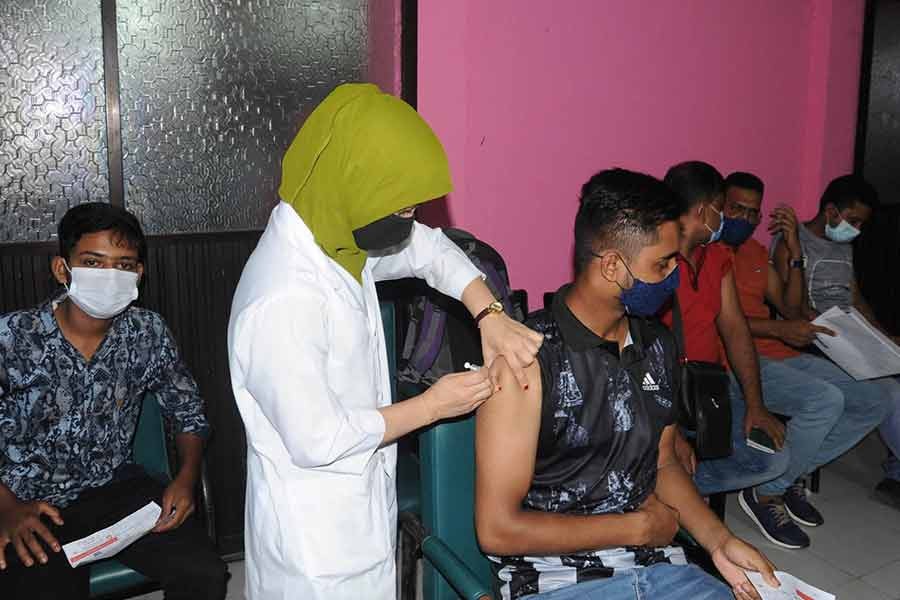Given that intellectual property rights including patents reward and encourage innovators for more research and development (R&D) leading to inventions, a least developed country (LDC) like Bangladesh which will graduate in 2026 may seek different way-outs including local production of Covid-19 vaccines to make them easily accessible to its people. To this end, more than one hundred country governments, Noble laureates, international civil societies, philanthropies, and non-government organisations have been campaigning relentlessly and trying to form public opinion throughout the world.
Declaring the knowledge relating to vaccine technologies including mRNA, DNA, RNA, inactivated, viral vectors, protein subunits and the know-how as public goods to be placed in the public domain and freeing from exclusivity of patents as laid down in the World Trade Organisation (WTO) Agreement on Trade-Related Aspects of Intellectual Property Rights 1994 (TRIPS) turns to be a demand for the vaccine accessibility. This claim grows since conducting the vaccine R&D, its production, quick departmental approval jumping the queue and smooth distribution are mostly made of public funds in partnership with a small number of pharmaceutical companies.
Granting a temporary waiver of vaccine patents and facilitating the transfer of relevant technology and know-how and the supply of necessary raw materials to low-and lower middle-income countries (LLIMCs) on the pretext of health emergencies and security exceptions as covered under provisions of the TRIPS is currently put on the table as another way-out. The vaccine accessibility campaign is also supposed to boost on exempting graduating LDCs from patenting pharmaceuticals through the WTO General Council or Ministerial Conference as is demanded by the WTO members.
Streamlining the vaccine production through compulsory licence that can ease formalities under article 31 and parallel imports under article 6 of the TRIPS is also claimed to make the vaccine crisis disappear. Further, enriching the COVAX technology pool with the vaccine technology and know-how and facilitating their transfer to LLIMCs or vaccinating unaffordable peoples free through the COVAX is demanded to commensurate the existing vaccine inequity. In addition, bringing bulks - active pharmaceutical ingredient (API) - the chemical molecule that follows a specific formulation and set of specifications, including drug substance and manufacturing vaccines jointly with local partners in such developing countries and LDCs is taken to slash manufacturing costs and break the vaccine nationalism shackle as is evident from vaccine companies concentrating on production mostly in their respective territories, controlling supply and prices, and non-allowing the transfer of vaccine technologies to other countries. Together with the above, non-committing to bilateral investment treaties that curtail the existing and impending patent waivers may also be an option to ensure people with easy accessibility to vaccines.
The recently concluded tripartite Memorandum of Understanding (MoU) with the government of Bangladesh, China National Pharmaceutical Group Co., Ltd. (commonly referred to as Sinopharm) and Incepta Pharmaceuticals Ltd. to locally produce the inactivated Covid-19 vaccine, namely, Sinopharm vaccine developed by Sinopharm/Beijing Bio-Institute of Biological Products Co Ltd appears as a milestone to help the country in producing the vaccine locally. Under the MoU, Incepta would bring in the material in bulk, and bottling, labelling, and finishing of the vaccine would be completed in the country making the price comparatively very low and enabling easy access to the vaccine. This cooperation is, at the same time, believed to strengthen China's 'build a great wall against Covid-19' like commitment to defeating the pandemic at an early date and mitigating the global vaccine gap between high- and low-income economies. This arrangement can also part with the vaccine nationalism at least in terms of bringing the bulk, manufacturing the finished product as per the local company's production capacity on employing the country's cheap labour, and supplying it at home and abroad at a cheaper rate.
This type of vaccine producing arrangement is the 1st in Bangladesh, making the country 25th in the world as the vaccine producing country and it is China's 5th of the kind along with UAE, Egypt, Indonesia and Brazil. Such MoU with the Bangladeshi firm may be treated as the China's commitment to make Chinese vaccines global public goods in its contribution to ensuring vaccine accessibility and affordability in developing countries and LDCs in particular, as is solemnly announced by the Chinese President Xi Jinping at the 73rd World Health Assembly held in May 2020.
However, it is not clear yet whether China will directly transfer the Sinopharm vaccine technology and the know-how to developing countries and LDCs under any technology transfer agreement or refrain from claiming patents therein as part of declaring its vaccines as global public goods.
Further, it is also not reachable whether the MoU contains any clause that can prevent any other Bangladeshi pharmaceutical company having the manufacturing capacity from reverse-engineering or deformulating the vaccine i.e., identifying, quantifying, and characterising the original formula's APIs to obtain the code, refining the model, manufacturing with departmental approval etc., and supplying it at home and abroad. However, such deformulation is permissible in the wake of the TRIPS patent waiver for pharmaceuticals until the country's graduation in 2026 or until such period as may be granted by the WTO General Council or 12th Ministerial Conference scheduled to be held in Geneva later this year in response to the temporary vaccine patent waiver request or graduating developing countries' request for 12 years' pharmaceutical patent exemption.
So, in the absence of any clause in the current MoU or in the future agreement whatsoever compromising local competing companies' utilisation of TRIPS flexibilities already mentioned in the text or to be agreed upon in the future, the MoU with the Chinese or the like in the future authorising local production and supply of the vaccine at a reduced price compared with varying prices of imported ones will accelerate the country's endeavours to make Covid-19 vaccines easily accessible and affordable to the people, not only in Bangladesh but also in other parts of the world.
Dr. M Towhidul Islam is Professor, Department of Law, University of Dhaka
Dhaka. [email protected]


